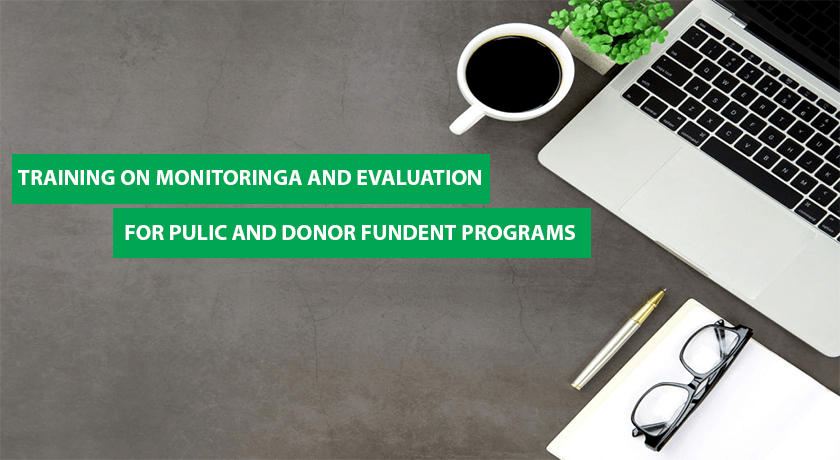Training on Effective M&E for Public and Donor-Funded program

INTRODUCTION
This training introduces key principles and practices in the management, monitoring, and evaluation of international development projects, and equips participants with project management, Monitoring, and Evaluation skills. The training blends planning and management principles with skill development related to data collection and analysis.
FOR WHOM IS THIS TRAINING INTENDED?
This training is intended for Project Management Officials, government officials, department heads and program managers; policy makers and program implementers; development practitioners and activists and NGO and CSO members, University Researchers among others.
TRAINING DURATION
10 days.
OBJECTIVES
The training is aimed at introducing and equipping participants with skills in;
- Understand the concepts of monitoring and evaluation
- Designing M&E systems and frameworks
- Understand the framework
- Preparation and implementation of monitoring and evaluation
- Determine relevant indicators and data necessary for evaluation
- Defining realistic expected results based on appropriate analysis
- Monitoring progress toward results and resources consumed with the use of appropriate indicators
TRAINING CONTENT
Module 1:Basic Concepts in monitoring and evaluation
- Introduction to M&E
- M&E and the project/programme cycle
- Importance of M&E
- Purposes and uses of M&E
- Identifying gaps in M&E
- Barriers to effective M&E
- Introduction to Problem Analysis
Module 2: Results-based M&E
- Definition of Result Based M&E
- Why results-based management?
- Results-based M&E outline and cycle
- How to use results-based management M&E
- Result Based M&E tools
- The performance Indicators and performance measurement framework
- Steps to complete a Performance Measurement Framework
Module 3: Readiness Assessment & Determination of Outcomes for M&E
Readiness Assessment
- M&E readiness assessment and its significance
- Aspects of M&E readiness assessment
- How to conduct Readiness Assessment
Determination of Outcomes
- The Importance of Outcomes
- Issues to Consider in Choosing Outcomes to Monitor and Evaluate
- Selecting Key Performance Indicators to Monitor Outcomes
- How to choose Good Performance Indicators
- The Use of Proxy Indicators
- The Pros and Cons of Using Predesigned Indicators
- Constructing Indicators
- Setting Indicators
Module 4: Baseline Assessment
- What is baseline assessment?
- Importance of baseline assessment
- Setting baselines and indicators
- Gathering data on baseline Indicators
- Use of Baseline data on indicators
- Examples of baseline study
Module 5: M&E Systems and Frameworks
- Principles of M&E system
- Identifying the purpose and scope of the M&E system
- Design & set up of M&E system
- Practical on designing the M&E system
- Definition of M&E frameworks
- Developing and implementing M&E frameworks
- Linking M&E frameworks to indicators
Module 6: PerformanceM&E for Results
- Types and Levels of Monitoring
- Links between Implementation Monitoring and Results Monitoring
- Needs of Every Results-Based Monitoring System
- Evaluation techniques
- Gender disintegration in M&E planning
- Communicating M&E findings
- The Use of Monitoring and Evaluation Findings
- Assessing program impact
Module 7: Statistical Concepts, Research Methodology, Data Collection and Management
- Meaning Qualitative and quantitative data
- Types of variables (Numerical, discrete variables, dummy variables,
- Determination of research designs
- Sampling techniques and sample size
- Designing research tools, Data collection techniques
- Entering categorical and continuous data
- Defining and labeling variables
- Validation and Sorting variables
- Transforming, recording and computing variables
Module 8: Tabulation and graphical presentation of data
- Descriptive Statistics
- Frequency tables
- Tables for categorical data
- Graphs and charts
Module 9: Data analysis and interpretation for M&E
- Hypothesis testing
- Comparing Means.
- Regression and Correlation Analysis
- Interpreting the data
- Introduction to analyzing qualitative data and qualitative data analysis software (NVIvo)
Module 10: Mobile Based Data Collection (ODK) and mapping
- Introduction to mobile phone data collection
- Advantages and challenges of Mobile Applications
- Components of Open Data Kit (ODK)
- ODK platforms and formats
- Downloading and install ODK Collect into mobile devices or usingAPK file
- Designing and creating Forms
- ODK Aggregate Server
- Transform data and Using GPS Coordinates for Mapping/Visualizing
Event Information
| Event Date | 02-06-2024 |
| Event End Date | 13-06-2024 |
| Individual Price | $2,200.00 |
| Location | Nairobi, Kenya |

